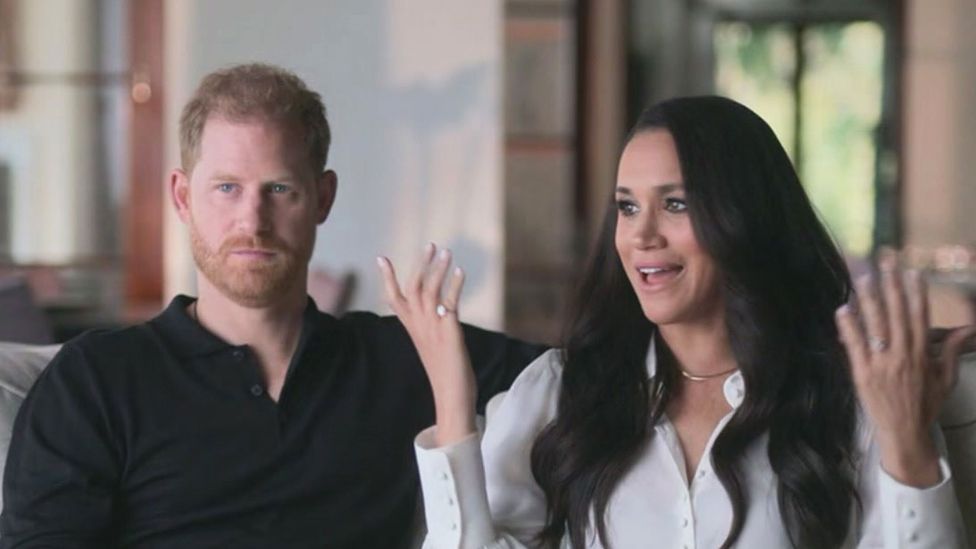Harry and Meghan: That sigh of relief? It's the Palace watching Netflix
- Published

Are Prince Harry and Meghan the victims of an oppressive royal system? Or are they the millionaire moaners of Montecito?
However the public views their TV show, there will be one set of delighted viewers - and that's in Buckingham Palace and the rest of the Royal Family.
They might get a bit of a frosty blast from the series, described as unable to hug and getting married for the wrong reasons. But there are no real bombshells or direct hits and nothing specific about any individuals.
Rather than reaching for their lawyers, they'll be reaching for the family therapists.
If this is the start of the Harry and Meghan's winter offensive - Netflix up to Christmas, then Prince Harry's memoir in the new year - it's begun with something approaching a truce.
The series had threatened to be a tell-all tale of why Prince Harry and Meghan felt they had to step down from royal duties. But this inside story so far hasn't provided much inside information.
The pre-publicity had raised explosive issues of race and planted stories - but so far at least, the series has been much more revealing about how the couple see themselves.
It's a love letter to themselves. They present themselves as under siege, facing prejudice and threats, at war with the media. And as such it's a view looking inwards rather than outwards, with a supporting chorus of friends and experts.
For a Royal Family worried at the prospect of being painted as out of touch and unsympathetic, or even worse as racists, the programmes so far have not revealed anything really embarrassing or awkward.
Home video of Archie features in Harry and Meghan documentary
King Charles, Camilla the Queen Consort, Prince William and Catherine are left in the background.
What it clearly shows is how emotionally raw Prince Harry remains about the loss of his mother, Princess Diana. His romance with Meghan seems inextricably linked to his experience of grief.
In terms of news lines, the biggest criticism is against the news writers, with the press seen as a haunting presence, with paparazzi chasing the royal couple and press attacks on them being amplified on social media, including racist abuse.
Prince Harry bristles at spending a life surrounded by such constant media intrusion.
If there are criticisms of the Royal Family, it's more of a complex, institutional argument than personal attacks. There's discussion of historic royal links to the slave trade and references to "unconscious bias".
Prince Harry talks of realising that his visits to "half the Commonwealth" hasn't been the same as understanding the experiences of communities facing disadvantage - and the series discusses the long legacy of colonialism.
Meghan recalls the pain of racist insults aimed at her mother after going to a concert together.
It's part of a powerful personal story. But the episodes, at least so far, are more about the psychodrama of a couple under pressure, recording their own feelings, more a video diary rather than a documentary.
There are no critical voices or discordant questions. How does a champion of equality feel about the title of 'Duchess'? What do they really make of the rest of the Royal Family?
Is it right for this mega-rich couple to present themselves as victims, when so many people are struggling to pay the bills and buy food? Are they now, with their Netflix and Spotify deals, part of the media they've been criticising?
It's not that kind of programme. It's a selfie on a global stage.
- Published8 December 2022
- Published6 December 2022
- Published6 February